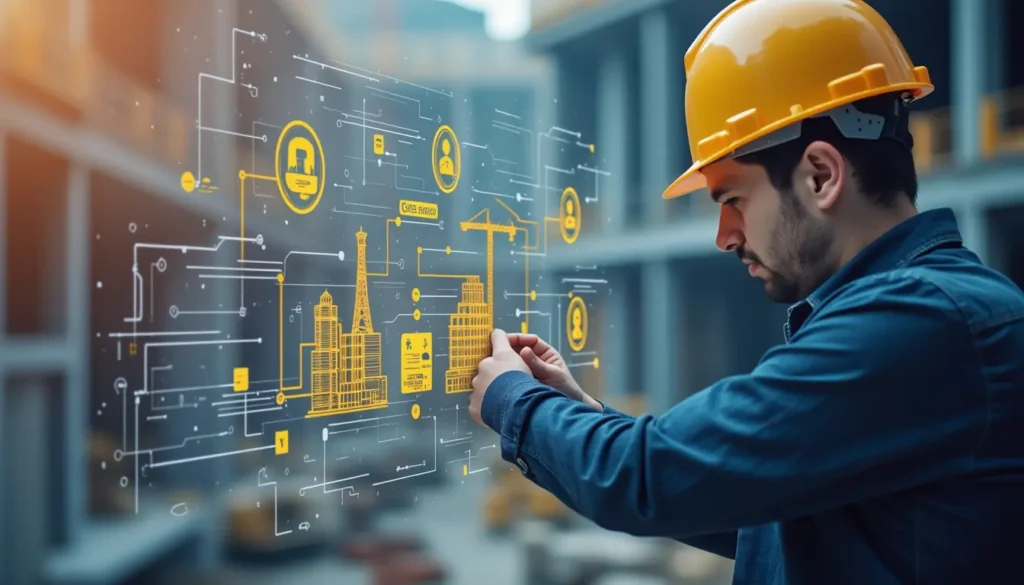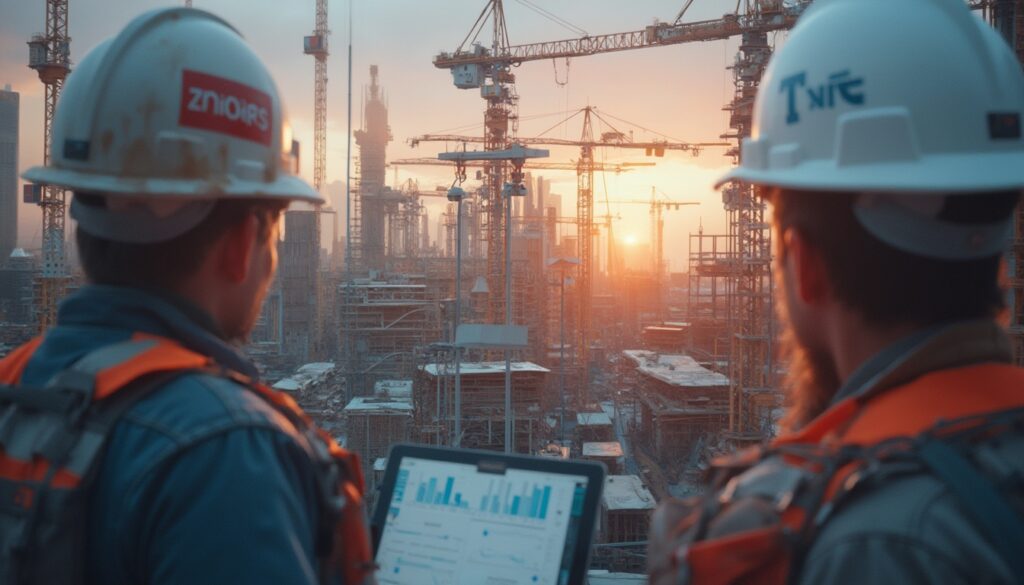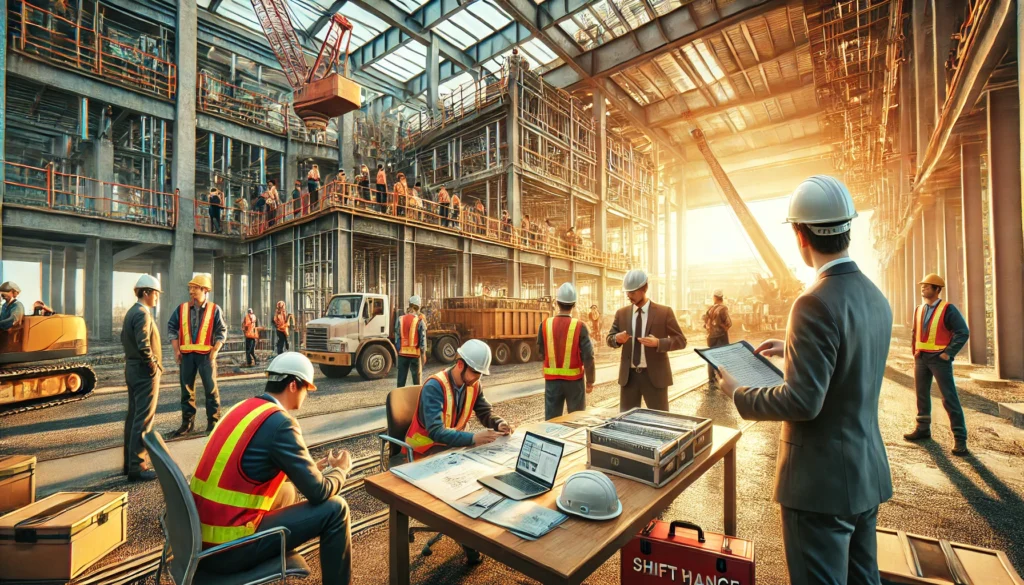In a world where digital transformation is advancing relentlessly, the future of the construction industry is also on the verge of significant changes. The future of the construction industry is not just a buzzword, but a necessity for sustainable growth in the sector. In light of increasing demands and challenges regarding efficiency, sustainability, and innovation, technological innovations play a crucial role in the evolution of the sector. Process awareness gains new momentum through digital technologies like digital construction and cloud solutions, which form the foundation for optimizing construction activities and ultimately for the long-term success of the industry. The future of the construction industry will be significantly shaped by these technological advancements.
This article examines how modern technologies, particularly artificial intelligence, cloud solutions, cybersecurity, and blockchain, are sustainably transforming the future of the construction industry and setting new standards for efficiency, safety, and transparency. These technologies not only provide solutions to current challenges but also open up new opportunities for the construction industry to meet rising expectations for sustainability and quality. By exploring these technological advancements, the article offers a comprehensive insight into how digitization and innovation are shaping and advancing the future of the construction industry.
Artificial Intelligence in Construction
Artificial intelligence (AI) is playing an increasingly important role in construction, revolutionizing the way projects are planned, executed, and managed. In the future of the construction industry, the use of AI algorithms enables significant optimization of construction processes and more efficient project management.
AI Algorithms for Construction Techniques
The implementation of AI in construction techniques allows for a more precise analysis and evaluation of data, leading to better-informed decisions. These technologies not only support the planning and execution of projects but also facilitate preventive maintenance and monitoring of construction infrastructure. With the application of AI, risks can be minimized, and safety on construction sites can be improved. In the future of the construction industry, AI will be an indispensable tool.
Process Optimization through AI
AI technologies offer significant advantages in optimizing workflows in construction. They enable the automation of work processes and improve communication among project participants. By using AI-based systems like Valoon, the creation of daily construction reports and delay notifications is automated, leading to more efficient project execution. Additionally, these systems ensure compliance with data protection standards, such as GDPR-compliant communication, and provide a secure environment for the exchange of documents and plans. The future of the construction industry will be significantly influenced by these developments.
Cloud Solutions
Valoon is revolutionizing project management through the use of cloud technologies, enabling seamless and efficient communication in the construction industry. By providing a platform where all project participants have access to the latest documents and plans, collaboration is greatly enhanced. This type of cloud solution will be a central component of the future of the construction industry.
Advantages of Cloud Technologies
The main advantages of using cloud solutions are improved data access and security. With cloud systems like Valoon, companies can securely store and manage their data while ensuring that all team members have access to the necessary information anytime and anywhere. This contributes to compliance with data protection standards and facilitates GDPR-compliant communication. The future of the construction industry will benefit from the widespread adoption of these technologies.
Examples of Cloud Applications
Valoon offers specific applications for the construction industry that automate the creation and management of daily construction reports and delay notifications. These tools reduce the time spent on manual data entry and increase the accuracy of reports. Additionally, the platform allows for easy project sign-up via QR code or link, without the need for extensive training in software usage. This promotes the adoption and use of technology in the field and is part of the future of the construction industry.
Cybersecurity in Construction
The increasing importance of cybersecurity is clear as more technological solutions like Valoon are integrated. These systems improve efficiency and communication but also increase vulnerability to cyberattacks, highlighting the need for robust security measures. Cybersecurity will be a critical factor for the future of the construction industry.
The Growing Importance of Cybersecurity
In the modern construction industry, protecting sensitive data plays a crucial role. With Valoon, a system that automates the creation and management of daily construction reports and delay notifications, the risk of data theft and misuse also increases. The platform ensures GDPR-compliant communication and offers features that strictly regulate access to project documents. This is essential to maintaining the integrity and confidentiality of information in the future of the construction industry.
Strategies for Data Protection
To further strengthen cybersecurity, Valoon implements several key strategies. First, the system enables easy and secure project sign-up via QR code or link, eliminating the need for extensive training on software usage and minimizing security risks. Furthermore, Valoon ensures that all project participants are always working with the most up-to-date plans and documents, providing for continuous updating and securing of data. These measures secure the future of the construction industry.
Blockchain for Construction Contracts
The introduction of blockchain technology in construction is revolutionizing the way contracts are designed and managed. This technology offers unmatched transparency and security, which is often lacking in traditional contracting methods. In the future of the construction industry, blockchain will play a central role.
Basics of Blockchain Technology
Blockchain is essentially an ongoing chain of records known as blocks. These blocks are connected by cryptography, ensuring the immutability and traceability of the information stored within them. In the future of the construction industry, blockchain technology will enable the creation of smart contracts that are automatically executed when predefined conditions are met. This minimizes the risk of delays or human errors and significantly improves efficiency.
Transparent and Secure Contracts through Blockchain
By using blockchain, all parties involved in a construction project can access a unified and immutable contract documentation. Changes to the contract or project plans are updated in real-time and are visible to all parties, enhancing transparency. Additionally, the data is protected from unauthorized access due to the decentralized nature of blockchain, ensuring the security of sensitive information. The future of the construction industry will greatly benefit from these innovations.
The use of blockchain in construction contracts ensures that all obligations and agreements are automatically verified and executed. This reduces the potential for disputes and fosters a trust-based work environment. The technology also allows for automatic payment release once specific work phases are completed, leading to fair and timely payments. The implementation of blockchain is still in its early stages, but its potential to enhance contract management in construction is undeniable. By ensuring transparency and security, blockchain helps make the future of the construction industry more efficient, reliable, and secure.
Opportunities for the Future of the Construction Industry
The future of the construction industry appears to be full of opportunities thanks to the application of these technological innovations. The digitization of processes and the automation of tasks enable higher efficiency and a reduction in human errors, which directly impacts the profitability of projects. The introduction of artificial intelligence and machine learning in construction management offers advanced tools for predicting problems and optimizing resources. These advancements lead to a smarter and better-informed construction industry.
On the other hand, the use of cloud solutions not only improves collaboration among the various stakeholders in the industry but also lowers infrastructure costs, as the need for physical data storage is eliminated. This is particularly important in the future of the construction industry, where resource efficiency and cost reduction are key aspects of success.
The implementation of technologies such as blockchain also opens up new possibilities for contract management and transparency in projects. By eliminating intermediaries and ensuring data security, a foundation of trust can be established between all parties, which is essential for large projects that require smooth and secure collaboration.
Impacts on Sustainability
Another area where the future of the construction industry will benefit is sustainability. Energy efficiency and the reduction of the carbon footprint have become fundamental priorities for the industry. Digital technologies enable more accurate monitoring of energy consumption and the environmental impacts of construction activities, facilitating decisions in favor of sustainability.
The adoption of sustainable building materials, the use of renewable energy, and the implementation of green building techniques are aspects that will be fundamental in the future of the construction industry. Thanks to the integration of digital tools, these efforts can be coordinated and managed more efficiently, contributing to the creation of environmentally friendly infrastructures.
Conclusion
The digital transformation is sustainably shaping the future of the construction industry, improving the efficiency, safety, and transparency of all involved processes. Technologies such as artificial intelligence, cloud solutions, and blockchain not only provide answers to current challenges but also open new horizons for flexibility and sustainability in the industry. By implementing these digital solutions, companies can revolutionize their ways of working, enabling them to respond better to the needs of a constantly changing market.
The advanced use of technologies like Valoon represents a significant step toward a smarter, safer, and more efficient construction industry. These developments not only influence how projects are carried out today but also lay the groundwork for future innovations in the sector. As we explore the impacts of these technological advancements, the potential for growth and improvement remains limitless. For companies willing to explore this next phase of digital transformation, now is the perfect time to contact Valoon and request a demonstration to pave the way for their future success.
The future of the construction industry is full of possibilities and opportunities for those willing to embrace innovation and technology. From artificial intelligence to blockchain, every advancement has the potential to profoundly change the industry and create a more efficient, sustainable, and safer construction environment. With the support of digital solutions like Valoon, the future of the construction industry is achievable for those who lead the change and fully leverage the benefits of digital transformation. Take the first step and discover how: book your demo now.








